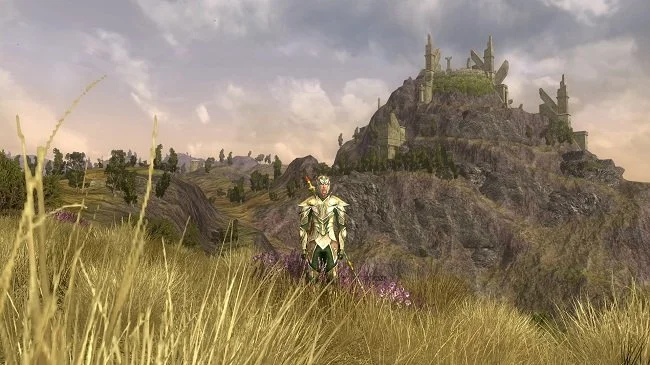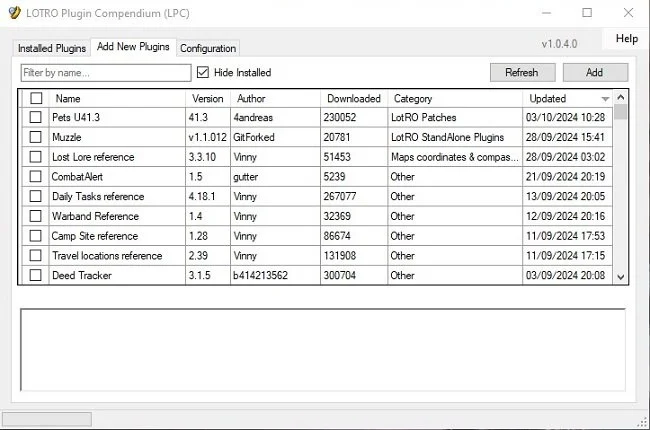LOTRO: The Benefits of Plugins
After my recent experiment involving tweaking the graphics settings in the MMORPG, The Lord of the Rings Online, I decided to see if I could improve my gaming experience with the use of mods. These are known within the LOTRO community as “Plugins”. They are created using the Lua programming language and are managed via an option on the character selection screen, after logging into the game. They are mainly used to augment the existing GUI, often presenting existing game data in a more convenient manner. Plugins can also be used to track information such as deed progress and to mark where specific items, resources and locations are on the in-game map. They cannot be used to issue commands or create macros. The most reliable source for Lua Plugins for LOTRO is via the website LOTRO Interface which maintains a comprehensive repository along with guides and FAQs.
As with other MMOs, the main issue with using any sort of mod or addon is cleanly installing all the appropriate files to the correct locations. While players can do this manually if so desired, the easiest way is to use a third party installation tool. LOTRO Plugin Compendium (LPC) is a windows based plugin management tool. There is also a Java version for Mac and Linux users. It can be used to search for existing Lua Plugins for LOTRO, as well as install, update and uninstall them as needed. It is broadly similar to Minion, for those familiar with the World of Warcraft mod manager. Once installed you can immediately start perusing the wealth of plugins that are available for LOTRO. Upon selection LPC will install all the necessary data to the appropriate game directories. Upon logging into LOTRO, the player has to click on the “Manage Plugins” button on the right of the character select screen to load those they wish to use.
After I installed LPC, I spent a lot of time trawling through the plugin search facility to try and find ones I thought would be beneficial to my play style. I also watched a lot of YouTube videos and read through various subreddits and forums. What I found was that there are a lot of plugins designed around combat and analysing your performance. These are very useful for min-maxing and monitoring data such as DPS, aggro and buffs, when raiding. However, for a player such as I who mainly does PVE content on its default level of difficulty, few of these plugins are relevant. Fortunately, there are plenty of “quality of life” plugins to be found. Addons that present in-game information in a more accessible fashion, so you don’t have to go and search for it at an inopportune moment. Hence I installed the following:
Titan Bar: A transparent toolbar that is located at the top of your screen, which can have a wealth of customisable information displayed on it. I use it to track in-game currency expenditure, damage to gear and reputation progress. I also have an in-game clock that tells you what phase of the day the game is currently in and how long it is until the next one.
Travel Window II: Adds a new window to your screen which lists all your quick travel skills. These can be presented in various different ways and you can minimise the window when not using it. I freed up two complete in-game quickslot bars by switching to this plugin.
Alt Inventory: Does exactly what the name says. Adds a drop down window where you can search your various alt’s inventories. Both bags and vault respectively. This plugin is invaluable if you are an MMO “pack rat”.
So far, I am not aware of the plugins causing any performance issues in LOTRO. However, I am only using three at present. Those installed do not clutter my screen in any way. All can be minimised when not actively used. In fact the Titan Toolbar vanishes during combat which is very convenient. They all provide exactly the functionality I require. I suspect that the key to effectively and efficiently using Lua Plugins for LOTRO, is the same as it is for using addons in any other MMO. Only install and use what you need and don’t get carried away. It is also worth remembering two important things about plugins. They are fan developed and maintained and game updates often break them. Hence, support for them is not indefinite or immediate. It is therefore possible that one day, a plugin you rely on may stop working. With all this in mind, a sensible selection of Lua Plugins for LOTRO can potentially enhance the game and improve your player experience.






























